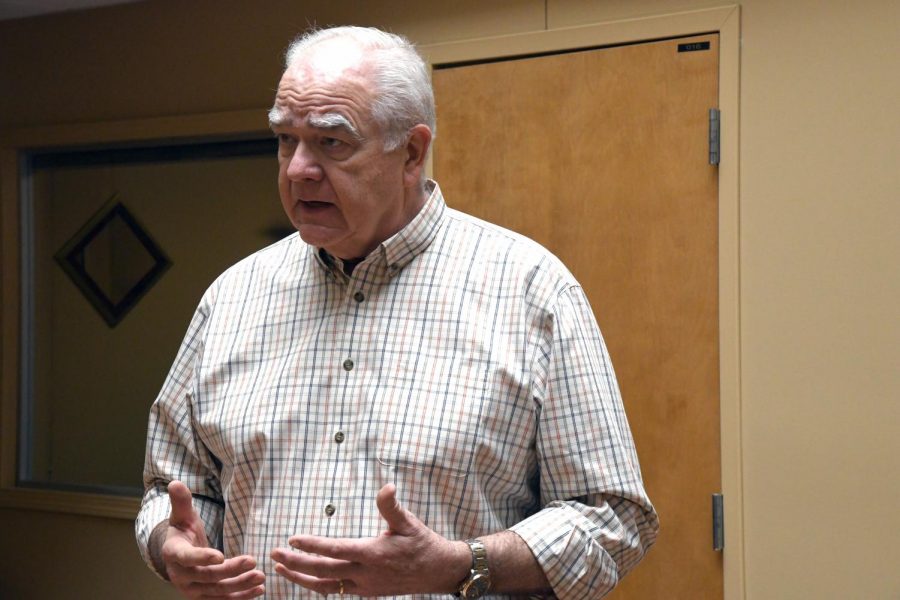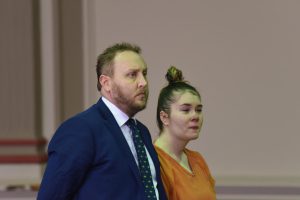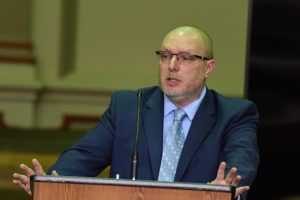Community responds to governor’s new orders as Coronavirus reaches next stage
March 11, 2020
Governor Mike DeWine announced Wednesday another confirmed case of the Coronavirus in Ohio, this time in Stark County, bringing the total number of cases in the state to four.
Three other cases are being monitored in Cuyahoga County.
According to DeWine, a 53 year-old man is currently being treated after contracting the disease in late February. He is hospitalized at Mercy Medical Center.
This is the first case of community spread, moving Ohio to a “new phase of this crisis,” DeWine stated.
“The significance of this case is it was a community spread infection, which means this is a confirmed case of COVID-19 in a patient who has no travel history and no known exposure to another patient with COVID-19. So that means, in Ohio, it is spreading in the community,” said Doctor Jack Butterfield, Medical Director for the Zanesville-Muskingum County Health Department. “We knew this was coming, today is the day that it has arrived. But that also makes this a game-changing day.”
With that phase comes new preventative measures in addition to those enacted Tuesday when colleges and universities across the state announced campus closures.
Large, public gatherings are also being deterred, including athletic competitions and celebrations.
Currently, K through 12 schools are not impacted.
Senior Population
The newest order DeWine announced focuses on protecting the elderly population by limiting visits to nursing homes and assisted living facilities.
According to DeWine, the order will limit visitors to one per day. Additionally, nursing homes will be required to log all visitors entering the facility, including staff and vendors.
Before seeing residents or patients, visitors will also be screened with a number of health questions and having their temperature taken.
Locally, the Muskingum County Center for Seniors is taking its own precautions by indefinitely canceling all activities and suspending congregate dinners at its three locations — the Muskingum County Center for Seniors in Downtown Zanesville, the Bonnie Longaberger Senior Center and the Zanesville High Rise Center.
“That does not mean that food will not be available for those seniors that are in need,” said Ann Combs, Executive Director of the Muskingum County Center of Seniors.
Seniors will be able to pick up “grab-and-go” style meals to take home to eat for the time being.
Combs emphasized that limited contact is the best way to protect the most vulnerable senior population.
“During this time, it is imperative that we pull together as a community,” said Combs.
Combs encourages the public to call elderly friends and family members to check on their needs.
“That’s one of the great things about Muskingum County, we are generous and we are kind,” said Combs. “I ask you to keep in mind those seniors as we face this together as a community that we pull together, ask what their needs are and try to be there to serve that need.”
Mass Gatherings
While extra measures are taken to protect the elderly population, the general population is also facing restrictions regarding large gatherings.
“Because of community spread, we have to give much more attention to the potential for this disease to spread in what we call mass gatherings — groups of people that get together for social or business reasons that are in close proximity, in tight quarters, meetings, large parties, sports, that sort of thing — all of this has to be kept in mind,” said Butterfield.
Under DeWine’s order to limit large gatherings, a number of athletic events will proceed without spectators, including the Tri-Valley girls basketball State semi-final game on Thursday, as well as events at local universities.
“We shouldn’t panic, but we should take rational actions to protect ourselves, our loved ones, and others,” said DeWine. “What we are seeing with this virus is predictable, and we have the ability to control risk. Every expert has told us that there is a risk in any kind of mass gathering, so you must ask yourself if going to a large event is worth the risk.”
Doctor Amy Acton, Director of the Ohio Department of Health, explained during a press conference with DeWine that the precautions are being taken in an effort to “flatten the pandemic curve” by slowing the spread of the disease and preventing healthcare systems from becoming overwhelmed.
Scope of the disease
“We know it’s going to be bad,” said DeWine. “The question is how bad is it going to be.”
DeWine said individuals should consider whether what they’re doing is worth the health risk by weighing whether it is a necessity.
“Each one of us is having to change how we live,” said DeWine.
For his office, that includes limiting face-to-face contact and unnecessary travel.
“We have the potential of what you’re seeing in Italy,” said DeWine.
According to Acton, up to 40 percent of the population could become infected with the disease.
However, Butterfield explained that for most, the Coronavirus won’t be serious.
According to Butterfield, 80 percent of those who contract COVID-19 will have a mild form of the disease.
“They aren’t even going to know that they have it. It’s like having a bad cold or influenza,” said Butterfield. “Only 20 percent of the people who contract COVID-19 will have more of a disease that requires more aggressive medical treatment. About three to four percent who contract COVID-19 will end up dying of this disease.”
Butterfield explained the importance of taking precautions in order to keep the number of cases low.
“We’re trying to be very prepared so those numbers remain small, but the fatality rate is significant, and that’s why this is such an important problem even though the numbers are very small right now,” said Butterfield.
According to Butterfield, similar measures were taken for past diseases, but perhaps not with such magnitude. Further, the utility of electronic communication now offers a more sophisticated way to share information in a more immediate fashion.
“We’ve seen coronavirus before, in fact, there are four coronaviruses that cause the common cold, but this is a new one. So since it’s a new one, number one, no one has ever been infected with this before, so no one has immunity to it,” said Butterfield. “That makes all of us susceptible. The second thing is since it’s a new virus, we’ve never had the opportunity to develop a vaccine for it, so no one can be protected with a vaccine. That’s what makes this unique.”
Future decisions
As the spread of the disease continues to progress, Butterfield said it is important for the public to rely on credible sources of information to make decisions about their daily life, including the CDC, Ohio Department of Health and the Zanesville-Muskingum County Health Department.
This is not a time for panic, but this is a time for being prepared.
At the moment, Butterfield said it is not necessary to stop daily routines.
“I think that it is absolutely, perfectly reasonable to continue with your normal life activities, which includes shopping and so forth. You can practice social distancing, which, basically, is defined as about a six-foot distance between you and others,” said Butterfield. “That can be accomplished in the grocery store and other places you might commonly go. This is not a time to have family reunions and large gatherings for social or business reasons.”
As the disease continues to spread throughout the state, as it’s predicted, Butterfield said Muskingum County is ready.
“We are prepared. The community services are all working together with EMS and fire and police and the health department and the hospital,” said Butterfield. “We’re all working together to try and keep our arms around this problem and protect our community as best as possible.”




















Cyndi J Royce • Mar 12, 2020 at 3:46 am
This is ridiculous and just inducing panic. Ohio has almost 12 million people. If 4% of the population dies from this that would be 480000 people. That isn’t going to happen. No disease in this century has killed that many people. Most people won’t even know they have it. Washing your hands and not touching your face is the only way to avoid getting sick. Testing everyone does no good because there is no cure. They keep you comfortable til you die or get better. Quit inducing panic. More people die from the flu and that has a vaccine. Of course people in nursing homes and their visitors are more susceptible. the elderly for the most part are there because of chronic disease.